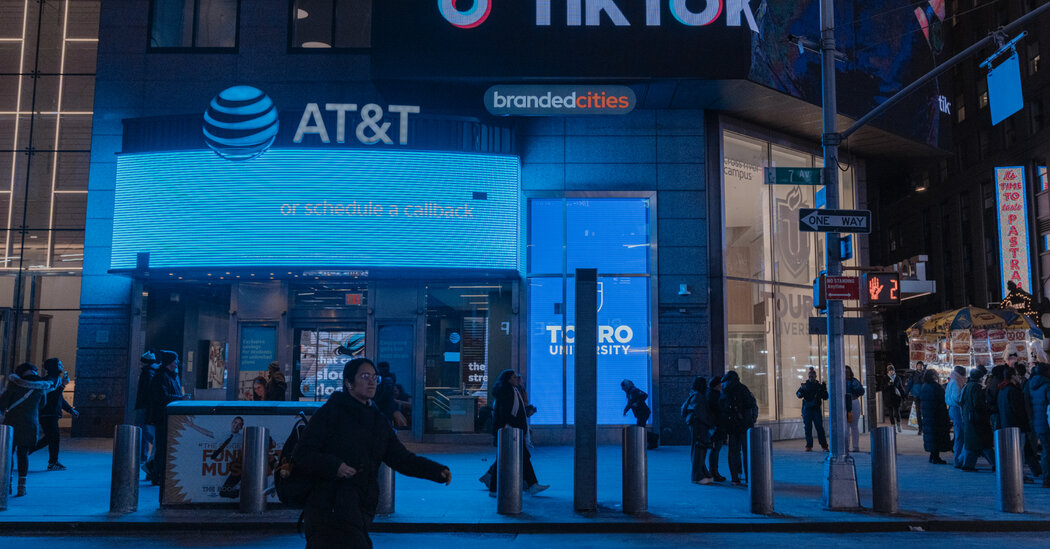Officials in Europe worried that the app was glamorizing eating disorders. The ban is TikTok’s latest effort to counter criticism about its effect on teen mental health.
Source link
برچسب: TikTok
-
TikTok Bans #SkinnyTok After European Regulators Raise Concerns
-
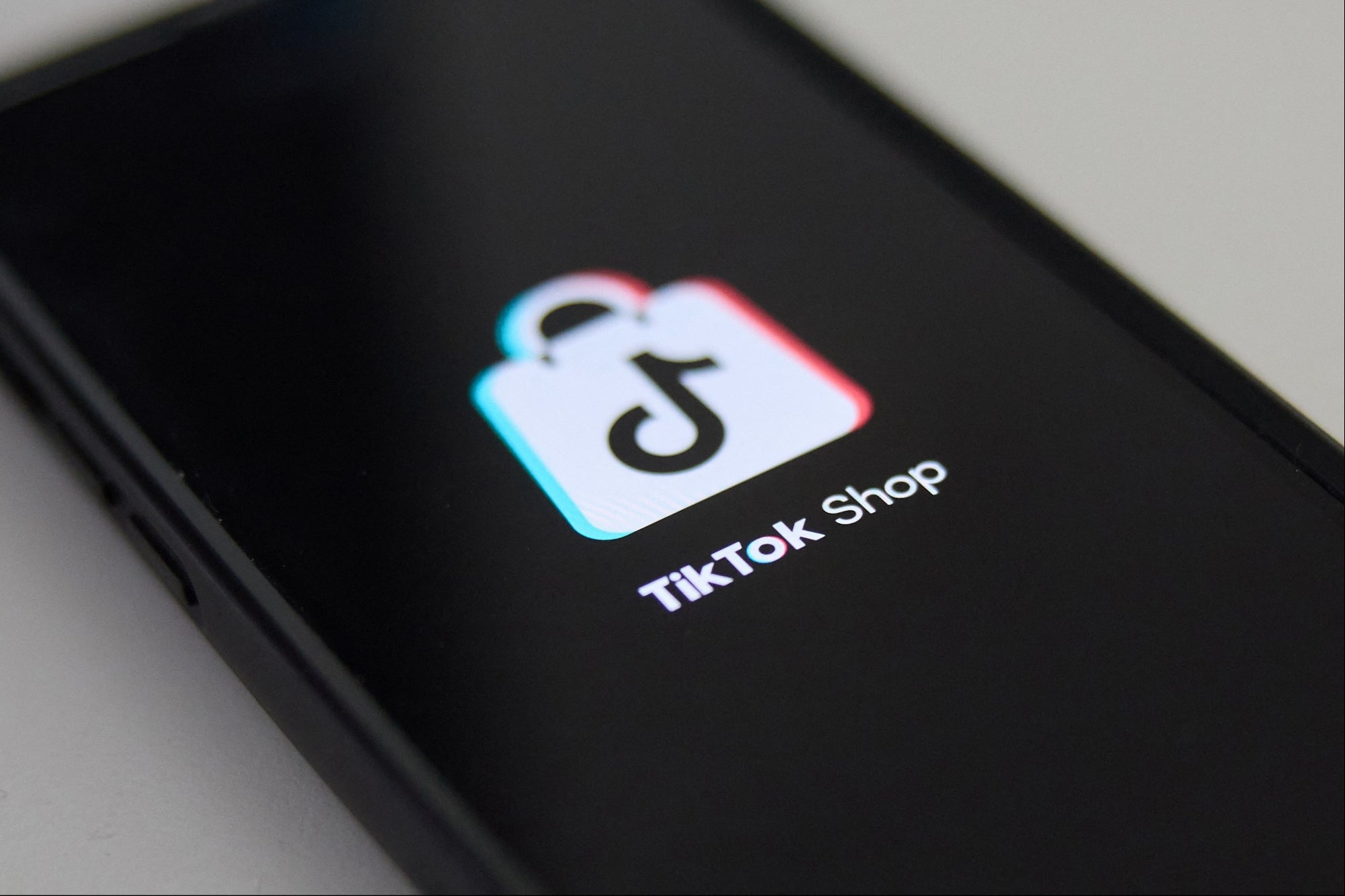
TikTok Layoffs Hit E-Commerce Division in US, TikTok Shop
TikTok’s e-commerce unit, TikTok Shop, is facing layoffs in the U.S.
TikTok Shop head Mu Qing circulated an internal email to U.S. staff late Tuesday, telling them to work from home on Wednesday because some would receive emails indicating their roles had been cut. In the memo, which was viewed by Bloomberg, Mu advised staff to expect “operational and personnel changes” to TikTok’s U.S. operations and global key accounts divisions “beginning early on Wednesday.”
Related: Microsoft’s Mass Layoffs Affected at Least 800 in Software Engineering, According to New Documents
The global key accounts team works closely with large brands, while operations supports merchants, partners, and creators on TikTok.
Mu wrote that TikTok was laying off workers to “create more efficient operating models for the team’s long-term growth,” and framed the job cuts as “difficult discussions,” per the memo.
According to Business Insider, employees started receiving emails informing them that they were impacted by layoffs beginning Wednesday morning.
It is unclear how many employees were affected by the layoffs. Mu stated in the memo that TikTok’s goal was to quickly tell impacted employees they were let go.
Related: Google Layoffs Affect Hundreds in Division Working on Chrome Browser, Pixel Phones
Last month, TikTok Shop let go of some U.S. employees as it restructured its governance and experience team.
TikTok officially introduced Shop to the U.S. in September 2023. The shopping marketplace is a tab on the TikTok video app and features items for sale from third-party sellers. It keeps shoppers within TikTok to complete purchases and uses its engaging algorithm to suggest products customers might be interested in.
In 2024, TikTok Shop attracted over 47 million U.S. shoppers, with Americans spending $32 million per day shopping on the social media app, according to Capital One research.
This year, TikTok Shop sales have fallen due to tariffs, four TikTok Shop staffers told Business Insider. Tariffs rose as high as 145% on Chinese goods in mid-April. Earlier this month, the U.S. temporarily lowered tariffs on Chinese goods to 30% while China reduced its levies on U.S. imports from 125% to 10%. BI‘s sources disclosed that in early May, TikTok Shop’s daily U.S. sales from foreign sellers were down by close to 25% month-over-month due to tariffs.
Related: ‘More Than Marketing Tools’: Some Business Owners Are Worried About the Possible TikTok Ban
TikTok has 7,000 U.S. employees, with over 1,000 employees located near Seattle. The company has other offices in New York, California, and Texas, per Bloomberg.
TikTok has until June 19 to find a new owner in the U.S. and separate from its parent company, ByteDance, or face a ban. The deadline is in response to a law passed by Congress in April 2024 and has been extended twice by President Donald Trump as TikTok attempts to find a buyer. Trump, who has previously stated that he has “a little warm spot” for TikTok, said earlier this month that he may extend the deadline further if no deal is reached by June 19.
So far, TikTok has received bids from Oracle co-founder Larry Ellison, AI startup Perplexity, AppLovin, Amazon, and former LA Dodgers owner Frank McCourt Jr., who teamed up with Shark Tank investor Kevin O’Leary and Reddit co-founder Alexis Ohanian on The People’s Bid for TikTok, among others.
TikTok’s e-commerce unit, TikTok Shop, is facing layoffs in the U.S.
TikTok Shop head Mu Qing circulated an internal email to U.S. staff late Tuesday, telling them to work from home on Wednesday because some would receive emails indicating their roles had been cut. In the memo, which was viewed by Bloomberg, Mu advised staff to expect “operational and personnel changes” to TikTok’s U.S. operations and global key accounts divisions “beginning early on Wednesday.”
Related: Microsoft’s Mass Layoffs Affected at Least 800 in Software Engineering, According to New Documents
The rest of this article is locked.
Join Entrepreneur+ today for access.
-
Breathe In, Breathe Out, Good Night: TikTok Invites Users to Meditate
Facing allegations that it knowingly lures young users into late-night scroll sessions, the company unveiled a new guided-meditation feature in the app.
Source link -
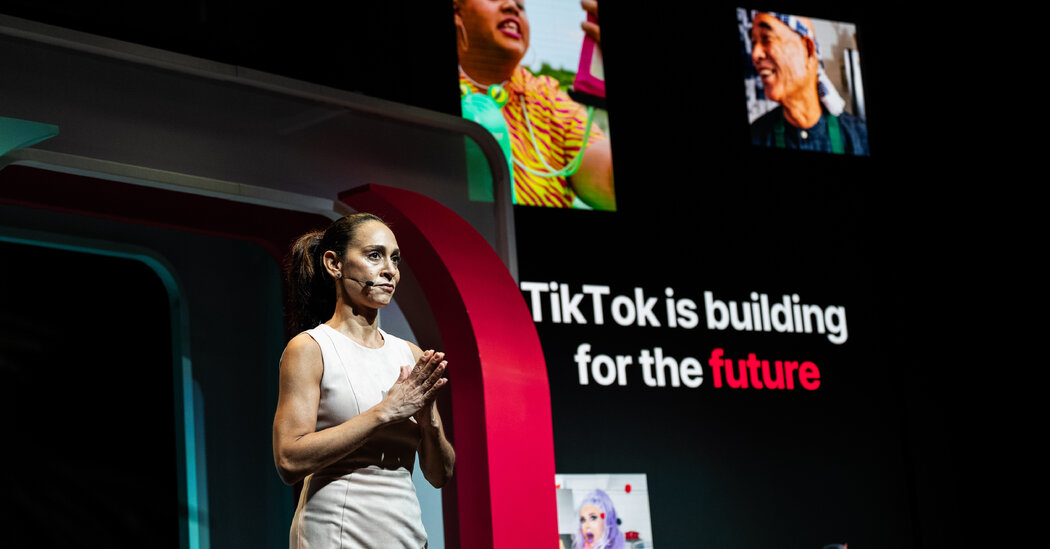
TikTok, Facing a U.S. Ban, Tells Advertisers: We’re Here and Confident
“TikTok is here — we are here,” Khartoon Weiss, the company’s vice president of global business solutions, told a packed warehouse of advertisers on Tuesday in Manhattan.
“We are absolutely confident in our platform and confident in the future of this platform,” she declared.
That statement was the closest TikTok advertising executives got to addressing the app’s uncertain fate in the United States in the company’s annual spring pitch to marketers. Under a federal law and executive order, the app is set to be banned in the country next month if the Chinese owner of the company, ByteDance, does not sell it.
Hundreds of representatives from companies like L’Oreal and Unilever and various ad agencies scrambled to find seats for an event hosted by the comedian Hasan Minhaj that heavily emphasized TikTok’s role as a cultural juggernaut.
TikTok was more than a video platform, Mr. Minhaj told the crowd. TikTok was “the cultural moments you talk about at work, the jokes you talk about in your group chat, the language you use in your everyday life,” he said.
The tone of the event marked a departure from TikTok’s presentation a year ago, when the company was smarting from the federal law that promised to ban the app in the United States because of national security concerns related to the company’s Chinese ownership. Last year’s pitch started with one of TikTok’s top executives telling roughly 300 attendees that the company would fight the law in court and prevail and was “not backing down.”
TikTok did not actually win in court — the Supreme Court unanimously upheld the law in January — but the company has earned an unusual reprieve from President Trump. He has essentially put a pause on the law, which was set to go into effect in January, most recently giving the company until June to find new owners. On Sunday, he suggested he would extend the reprieve again if ByteDance needed more time.
The presentation on Tuesday was a reminder that beyond the battles in Washington, TikTok faces the same pressures as any other major social media company — winning ad dollars and promising major brands safe spaces for their messages to run. TikTok has a foothold among marketers hawking everything from clothing to beauty hacks despite competition from Meta’s Instagram Reels and Google’s YouTube. TikTok says it has 170 million users in the United States.
At the event, the company promoted new tools that would let marketers run their messages alongside viral trends, and it pitched advertisers on the additional exposure they could get from running ads on TikTok during the Super Bowl. Ms. Weiss also told marketers that the company was eager to develop ways for advertisers to capitalize on search queries, as people increasingly use TikTok as an alternative to popular search engines like Google.
Krishna Subramanian, chief executive and co-founder of the influencer marketing firm Captiv8, attended the advertiser presentation and said that the audience had benefited from the reassurance about TikTok’s future.
“Hearing that TikTok is here to stay from TikTok leadership becomes really powerful, as we think about our strategies for 2025,” he said. “Seeing their investments within generative A.I., within product, within cultural moments — it’s where brands need to be.”
The event also highlighted some of the turnover that has taken place at TikTok in its past year of turmoil. Blake Chandlee, TikTok’s former president of global business solutions, who kicked off the event in 2024, recently resigned from his role, following the departures of other prominent executives in ad sales.
Mr. Minhaj’s appearance at TikTok’s presentation marks the start of a star-studded season of pitches from television networks and other tech companies to advertisers. YouTube’s annual advertiser pitch this month will feature a performance from Lady Gaga.
“Ten years ago, I was just a struggling comedian performing at dive bars, doing the occasional keynote for Vine,” Mr. Minhaj said. “I would have loved to have TikTok when I was starting out as a comic — we have seen comedians build entire careers off of it.”
-

Opinion | DeepSeek. Temu. TikTok. China Tech Is Starting to Pull Ahead.
China’s top leaders did not appear to fully grasp the power of artificial intelligence in July 2023, when one of us, Eric, and Henry Kissinger met them. Economic malaise hung in the air. But when the other of us, Selina, returned to China just 19 months later, the optimism was palpable.
Dinner conversations were dominated by DeepSeek and other A.I. chatbots. Electric cars whizzed by, while apps offered drone food delivery. Unitree humanoid robots danced and spun handkerchiefs onstage during the “Spring Festival Gala,” China’s most-watched TV program, making the company a household name overnight.
This is the country we’re dealing with. China is at parity or pulling ahead of the United States in a variety of technologies, notably at the A.I. frontier. And it has developed a real edge in how it disseminates, commercializes and manufactures tech. History has shown us that those who adopt and diffuse a technology the fastest wins.
So it’s no surprise that China has chosen to forcefully retaliate against America’s recent tariffs. To win the race for the future of technology, and in turn the war for global leadership, we must discard the belief that America is always ahead.
For a long time, China was slower to the game. In 2007, the year Steve Jobs unveiled Apple’s first iPhone, the internet revolution had barely begun across the Pacific: Only about 10 percent of China’s population was online, while the tech giant Alibaba was still seven years away from listing on the New York Stock Exchange.
The A.I. race appeared to follow the old pattern. The debut of ChatGPT in San Francisco in November 2022 led to a slew of copycat chatbots in China, most of which were estimated to be years behind. Yet, as with smartphones and electric vehicles, Silicon Valley failed to anticipate that China would find a way to swiftly develop a cheap yet state-of-the-art competitor. Today’s Chinese models are very close behind U.S. versions. In fact, DeepSeek’s March update to its V3 large language model is, by some benchmarks, the best non-reasoning model.
The stakes of this contest are high. Leading American companies have largely been developing proprietary A.I. models and charging for access, in part because their models cost hundreds of millions of dollars to train. Chinese A.I. firms have expanded their influence by freely distributing their models for the public to use, download and modify, which makes them more accessible to researchers and developers around the world.
Apps for the Chinese online retailers Shein and Temu and the social media platforms RedNote and TikTok are already among the most downloaded globally. Combine this with the continuing popularity of China’s free open-source A.I. models, and it’s not hard to imagine teenagers worldwide hooked on Chinese apps and A.I. companions, with autonomous Chinese-made agents organizing our lives, and businesses with services and products powered by Chinese models.
In the internet revolution, Western dominance of the market helped America’s digital economy swell to $2.6 trillion by 2022. That’s bigger than Canada’s entire G.D.P. For the United States to reap the benefits of the coming A.I. revolution, which is expected to have a larger impact than advent of the internet, the world needs to choose America’s computing stack — algorithms, apps, hardware — not China’s.
In a dozen years, China has gone from a “copycat nation” to a juggernaut with world-class products that have at times leapfrogged those in the West. Xiaomi — once best known as a maker of iPhone knockoffs — delivered 135,000 electric cars last year, while Apple gave up on its effort to produce an E.V. after burning $10 billion over a decade. China is now racing to deploy robots at scale, outlining plans for mass production of humanoids; in 2023, the country installed more industrial robots than all other nations combined. Along the way, the country also cultivated an abundance of STEM talent, robust supply chains, incredible manufacturing heft and a domestic ecosystem so brutally competitive that the only way to survive is to never stop iterating.
This China-dominated future is already arriving — unless we get our act together.
We should learn from what China has done well. The United States needs to openly share more of its A.I. technologies and research, innovate even faster and double down on diffusing A.I. throughout the economy.
Despite recent cuts in research funding, the United States continues to have remarkable strengths in university and private-sector innovation. Meanwhile, China is still playing catch-up on semiconductors. Additionally, the country faces significant headwinds of its own including a real estate crisis, mounting debt and weak consumer spending. That said, we wouldn’t underestimate the Chinese government’s resolve in tolerating near-term economic pain in pursuit of technological supremacy.
The United States imposed export controls on cutting-edge chips in order to stifle China’s A.I. progress. The country’s recent breakthroughs, however, illustrate that such sanctions instead fueled efforts by Chinese entrepreneurs to keep training and commercializing A.I.
At lunch during Selina’s trip to China, when U.S. export controls were brought up, someone joked, “America should sanction our men’s soccer team too so they will do better.” So that they will do better. It’s a hard truth to swallow, but Chinese tech has become better despite constraints, as Chinese entrepreneurs have found creative ways to do more with less. So it should be no surprise that the online response in China to American tariffs has been nationalistic and surprisingly optimistic: The public is hunkering down for a battle and think time is on Beijing’s side.
We’re no longer in the era when China is far behind us. If China’s capacity to innovate endures, if its A.I. companies continue to embrace openness, and if China stays on track to take over 45 percent of all global manufacturing by 2030, then the next chapter of the A.I. race will be an all-out dogfight on every axis possible. America will need every advantage it has.
Eric Schmidt, a former chief executive and chairman of Google, is the chairman and chief executive of Relativity Space. Selina Xu leads China and A.I. research in the Office of Eric Schmidt.
The Times is committed to publishing a diversity of letters to the editor. We’d like to hear what you think about this or any of our articles. Here are some tips. And here’s our email: letters@nytimes.com.
Follow the New York Times Opinion section on Facebook, Instagram, TikTok, Bluesky, WhatsApp and Threads.
-
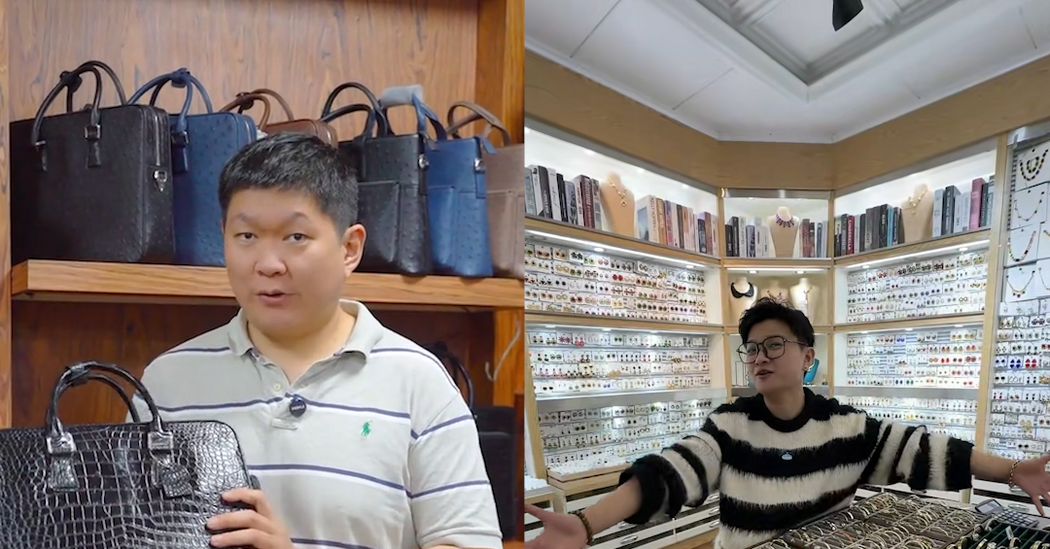
On TikTok, Chinese Manufacturers Open a New Line in the Trade War
Chinese manufacturers are flooding TikTok and other social media apps with direct appeals to American shoppers, urging people to buy luxury items straight from their factories. And amid the threats of sky-high tariffs on Chinese exports, Americans seem to be all in.
The pitch in the videos is that people can buy leggings and handbags exactly like those from brands like Lululemon, Hermes and Birkenstock, but for a fraction of the price. They claim, often falsely, that the products are made in the same factories that produce items for those brands.
American influencers have embraced the videos, promoting the factories and driving downloads of Chinese shopping apps like DHGate and Taobao as a way for shoppers to save money if the price of goods skyrockets under President Trump’s tariffs on Chinese imports. DHGate was among the 10 most downloaded apps in Apple’s and Google’s app stores last week.
The videos are surging in popularity on TikTok and Instagram, racking up millions of views and thousands of likes. Many of the posts also seem to have elicited Americans’ sympathy for China in comments, such as “Trump bullied the wrong country” and “China won this war.”
The videos offer a rare outlet for Chinese factory owners and workers to speak directly to American consumers through social media apps that are technically banned in China. And their popularity in America highlights increasingly vocal support for China on social media, similar to the outcry over the federal government’s potential ban of TikTok.
“It’s activating people politically in a similar way that you saw when we were going to cancel TikTok, but this time in the context of tariffs and the overall relationship with the two countries,” said Matt Pearl, a director who focuses on technology issues at the Center for Strategic and International Studies. “It does demonstrate their ability to communicate with American consumers to drive a message about our dependence on Chinese goods.”
Mr. Pearl suggested that the Chinese government might be allowing the videos to proliferate, since it has otherwise tended to discourage its citizens from posting videos that infringe on trademarked products from Western countries.
The Chinese Embassy in Washington and the Chinese Consulate in New York did not return requests for comment.
The volume of TikTok videos urging users to source products directly from Chinese factories soared almost 250 percent during the week of April 13, according to Margot Hardy, an analyst at Graphika, a social network analysis firm. On TikTok, the hashtag #ChineseFactory had 29,500 posts on April 23; on Instagram, it had 27,300 posts.
Retail experts — and vendors in China — say it’s unlikely that the most viral videos, which claim to be manufacturers for brands like Lululemon and Hermes, are peddling authentic products from those labels. Those factories often sign strict nondisclosure agreements and are unlikely to destroy their long-term relationships with major brands in exchange for hawking a few goods through direct sales, said Sucharita Kodali, a retail analyst at Forrester.
The Chinese government appears to be allowing the videos to proliferate, she said.
“A Lululemon or Chanel’s interests right now in China are probably No. 100 on the list of things that the Chinese trade minister and officials there are concerned about,” Ms. Kodali said. Manufacturers may also be rushing to close sales before new tariffs on May 2 add hefty fees to parcel shipments from China, she said.
Still, questions around the veracity of the goods aren’t stopping demand.
Elizabeth Henzie, a 23-year-old in Mooresville, N.C., said she found the manufacturing costs and retail prices described in the videos eye-opening. She made a spreadsheet of factories that claim they are selling dupes of sneakers, luxury bags and more, and linked it in her TikTok profile. That post has attracted more than one million views.
Ms. Henzie is now working as an affiliate partner for DHGate, where she will receive free products from the company for review videos and a commission if people make a purchase through her links. She said she believed that people in China were ultimately trying to help Americans.
“Seeing how other countries are coming together to try to help American consumers has boosted my morale,” Ms. Henzie said. “Even though it’s a negative thing that’s going on in America, I think it’s also pushing us to come together.”
TikTok, which is owned by the Chinese company ByteDance, has been taking down some of the videos, pointing to a policy that prohibits the promotion of counterfeit goods. But many have persisted through reposts. Even older videos about Chinese manufacturing are spreading in personalized news feeds amid major interest in the tariffs. TikTok declined to comment further, and Instagram, which is owned by Meta, declined to comment on the videos.
Sellers in China say they started posting the videos when sales fell. Yu Qiule, the 36-year-old co-owner of a manufacturing company in Shandong Province in eastern China that makes fitness equipment, said he started posting to TikTok in mid-March to find more customers after the tariffs prompted a wave of canceled orders.
Louis Lv, the general manager of export at Hongye Jewelry Factory in Yiwu, in Zhejiang Province, said his firm started posting on TikTok at the end of 2024, driven by a slowdown in domestic sales.
But he has watched the viewership in his TikTok videos soar since the Trump administration announced the tariffs. “The philosophy of Chinese businessmen is we will go wherever the business is,” he said in an interview.
In one of the most popular TikTok videos, a man is holding what he says is a Hermes Birkin bag while claiming to share its production costs from a factory. (The original video and account have been removed, but versions of the video are still widely circulating through reposts from other users.) He says that the purse costs less than $1,400 to manufacture but that the French luxury retailer sells it for $38,000 solely for the label. The man claimed that he used the same leather and same hardware to replicate the handbags without the logo, offering them for $1,000.
A spokesman for Hermes said its bags “were 100 percent made in France,” and declined to comment further. A spokeswoman for Birkenstock said that the videos showed “knockoffs” and that its footwear was engineered and produced in the European Union. The company said that it had contacted TikTok and that initial videos were deleted on April 15.
Lululemon, which has also been the target of viral TikTok videos from manufacturers who claim to sell its leggings for just $5, said it had been in touch with TikTok to remove false claims. Lululemon said in an emailed statement that it didn’t work with the manufacturers in the videos and warned consumers to be aware of potentially counterfeit products and misinformation.
Vanessa Friedman and Isabelle Qian contributed reporting from New York.
-
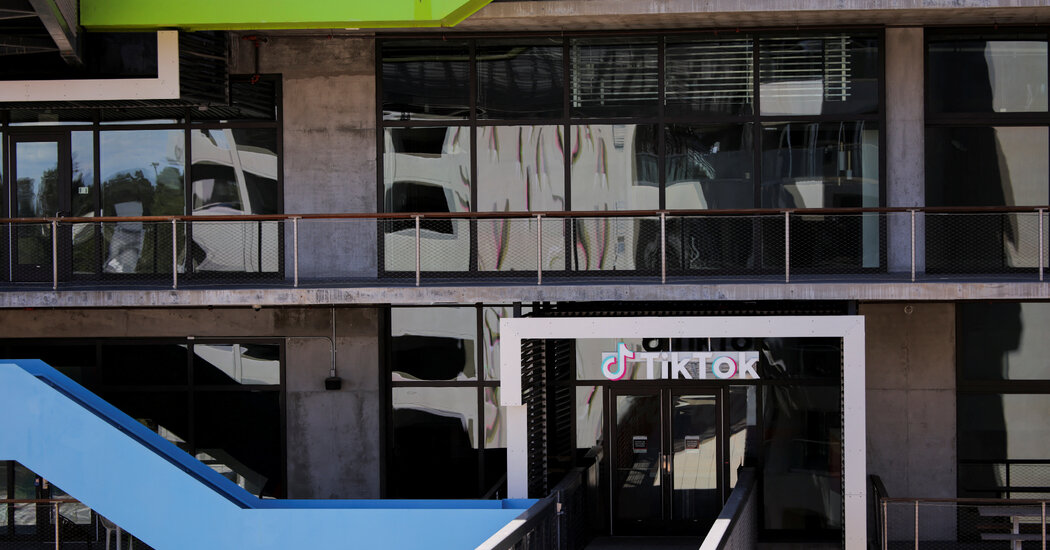
With TikTok Deadline Looming, Details of a Potential Deal Emerge
Two days before a deadline for TikTok to be sold to a non-Chinese company or otherwise face a ban in the United States, a deal has not yet been cemented but the contours of one are starting to take shape.
Vice President JD Vance said on Thursday that the administration would announce a plan for TikTok by Saturday. A federal law passed last year to resolve national security concerns related to TikTok and its Chinese owner, ByteDance, called for the app to be sold or banned in January. President Trump delayed the enforcement of that law until April 5.
Mr. Trump also met with top officials at the White House on Wednesday to consider a proposal for TikTok’s future. On Thursday, he told reporters that his administration was “very close to a deal with a very good group of people,” and would consider using TikTok as a negotiating chip with China on tariffs.
While TikTok has enjoyed interest from potential buyers including Amazon, the Trump administration is eyeing a deal that would sidestep a sale of the entire company, according to four people familiar with the negotiations, who spoke on the condition of anonymity. The plan would be to spin out TikTok into a new company and bring on new American investors to reduce the ownership stakes of Chinese investors.
The private-equity giant Blackstone and the venture capital firm Andreessen Horowitz are considering investments, they said. Two of the people suggested that the private equity firm Silver Lake was also considering an investment. Current investors, like Susquehanna and General Atlantic, would retain a stake in TikTok, and Oracle, which processes and serves TikTok user data, would likely maintain at least an operational role in managing TikTok’s data, three of the people said.
The down-to-the-wire negotiations are nothing new for TikTok, which has repeatedly wriggled out of earlier scrutiny in the United States. The app has cemented its role as a cultural juggernaut in the country, where it has more than 170 million users.
TikTok and Silver Lake didn’t respond to a request for comment. Andreessen Horowitz declined to comment.
A White House spokesperson said any announcement on TikTok would come from Mr. Trump and declined to comment on the details.
Many aspects of the deal under consideration remain murky. It’s not clear what will happen to TikTok’s coveted algorithm. Two people suggested that the new entity could license the algorithm from ByteDance. Under the law, a new TikTok entity cannot cooperate with ByteDance “with respect to the operation of a content recommendation algorithm” or for data sharing.
“Congress said that for national security purposes, there has to be an operational severing between China, this new entity and the algorithm,” said Jim Secreto, a former counselor for investment security at the Treasury Department, who helped shape the Biden administration’s policy on TikTok.
TikTok, which spent most of the last year trying and failing to defeat the law in courts, has maintained that it is not for sale, in part because the Chinese government would block a transaction. The Chinese government’s latest stance on TikTok is unclear.
“We have a situation with TikTok where China will probably say, ‘We’ll approve a deal, but will you do something on the tariffs?’ The tariffs give us great power to negotiate,” Mr. Trump told reporters on Thursday. He clarified that he was not in active talks with China on TikTok and tariffs.
Questions over the deal’s legal uncertainty have prompted some of the firms interested in investing in TikTok to look for indemnification for their investments, one of the people said.
Congress, which passed the TikTok law in a rare bipartisan vote, may not support the deal Mr. Trump is eyeing.
Senator Josh Hawley, Republican of Missouri, said on Wednesday that he was skeptical of a deal that kept control of the app’s video recommendation algorithm inside China.
“If you can get a deal to actually sell the company and it meets the terms that the statute sets out, that’s fantastic; that’s great,” he said. “But if not, then I think you’ve got to enforce the statute and ban TikTok. This middle way, I don’t think is viable.”
David McCabe and Theodore Schleifer contributed reporting.
-
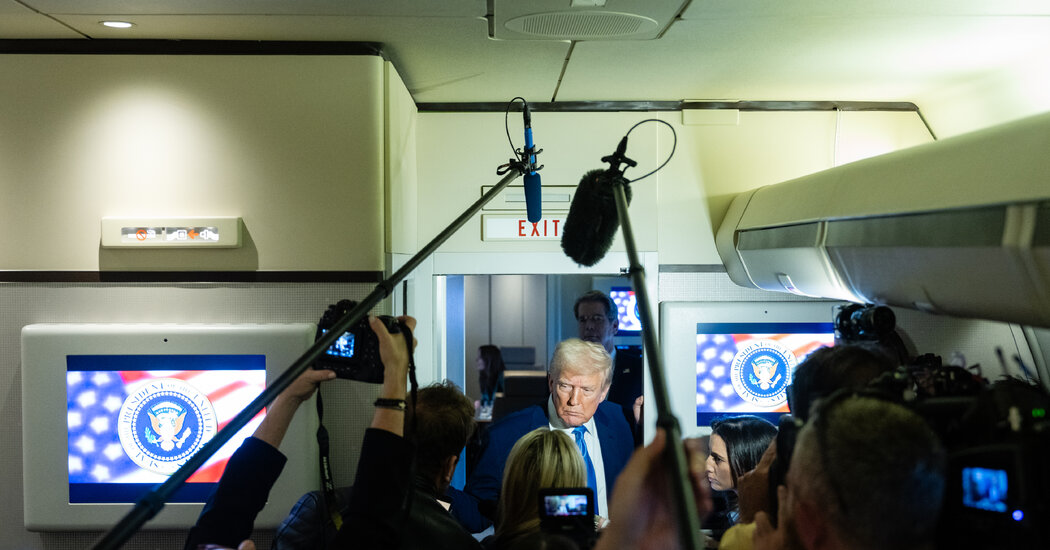
How Trump’s TikTok Negotiations Were Upended by China and Tariffs
Last Wednesday, the Trump administration believed it had a plan to save TikTok.
ByteDance, TikTok’s Chinese owner, along with some of its U.S. investors, and officials in Washington had coalesced around a new ownership structure for the popular video app, four people familiar with the situation said. That structure, the people said, would help TikTok satisfy the terms of a federal law that required the app to find a new owner in order to address national security concerns, or face a ban in the United States.
Under the plan, new investors would own 50 percent of a new American TikTok entity, while Chinese owners would retain less than 20 percent, the limit specified by the law, two of the people said. ByteDance told the White House that Beijing was comfortable with the general structure, two of the people said.
By Thursday morning, a version of a draft executive order from President Trump that outlined the broad strokes of the deal was circulating, according to a copy that was viewed by The New York Times.
Then the plan hit a wall. ByteDance called the White House with the news: Now that Mr. Trump had announced a slew of tariffs on Chinese imports, the Chinese government would not let the TikTok deal proceed, two of the people said.
In response, Mr. Trump bought the app more time. On Friday, he paused enforcement of the federal law, extending the deadline for a TikTok deal into mid-June.
“The report is that we had a deal, pretty much, for TikTok, not a deal but pretty close, and then China changed the deal because of tariffs,” Mr. Trump told reporters Sunday aboard Air Force One.
The standstill highlights how the video app is mired in a geopolitical tussle between the United States and China over trade and tech supremacy. It also illuminates China’s power over TikTok’s future in the United States, raising questions about whether a deal for TikTok will ever get done.
“The parties are too proud to negotiate, and so we’re stuck between two colossal economies that are butting heads against each other,” said Anupam Chander, a professor of law and technology at Georgetown University who has publicly opposed the law targeting TikTok. “TikTok has kind of been the mouse that got caught underfoot between these two elephants.”
The Chinese Embassy in Washington, TikTok and ByteDance didn’t respond to requests for comment. The White House referred The Times to Mr. Trump’s post on Truth Social announcing his extension for the debate over the app.
The administration and ByteDance had been hammering out a structure that would allow TikTok’s biggest U.S. investors, including the firms General Atlantic and Susquehanna International Group, to hold on to their investments while government officials brought in new funds to dilute the app’s Chinese ownership.
The tentative terms of the deal said new investors would own 50 percent of a new American TikTok entity. Current investors would own 30 percent and Chinese owners less than 20 percent, two people with knowledge of the matter said. Private equity giants like Blackstone and Silver Lake, along with the venture capital firm Andreessen Horowitz, had weighed taking a stake in the new entity.
The proposal was laid out in a lengthy and detailed document for investors, three people with knowledge of the matter said.
Two people involved in the deal said there was more work to do. Certain potential new investors viewed any deal as conditional, subject to the due diligence that accompanies any large transaction, they said.
China was always, to some extent, the wild card. The administration’s lead negotiators were not discussing the issue directly with the Chinese government, instead relying on ByteDance’s understanding of Beijing’s position, two people familiar with the matter said. Before the president’s announcement on tariffs last week, ByteDance believed that the Chinese government was comfortable with the structure coming together in Washington, the people said. But even before the tariff announcement, there was no guarantee that Beijing would provide its informal blessing or formal approval.
The talks about TikTok are likely to become even more complicated as a trade war between the two countries escalates. China initiated retaliatory tariffs after Mr. Trump’s announcement, prompting the president to warn on Monday that he would impose additional tariffs of 50 percent on the country if it persisted.
Mr. Trump has repeatedly suggested that he would consider lowering tariffs on China in exchange for its approval of a TikTok deal.
Leveraging tariffs for the negotiations is “really kind of a remarkable effort to coerce a sale of a foreign company,” Mr. Chander said.
But the trade war may still be underway in June, he said, adding: “We may well find ourselves back in Groundhog Day 75 days from now unless the tariffs have been resolved.”
TikTok has maintained for the better part of a year that it is not for sale.
On Friday, ByteDance acknowledged for the first time that it had been involved in negotiations with the U.S. government over the app’s future — but said any decision was ultimately in another party’s hands.
“There are key matters to be resolved,” a spokesperson for ByteDance told reporters in an email. “Any agreement will be subject to approval under Chinese law.”
Maggie Haberman contributed reporting.
